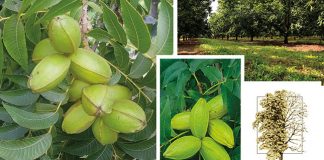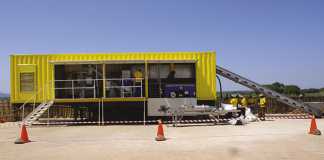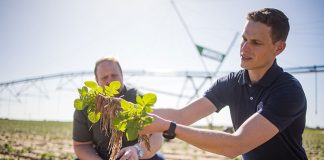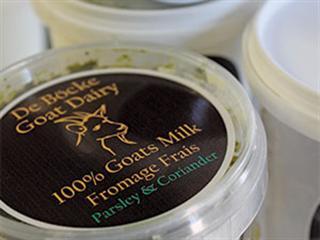
Many a stressed city dweller has pipe dreams about owning a farm or smallholding. But after thinking rationally about it, very few are prepared to take the plunge. Running a farm successfully – even a small one – demands considerable time, effort and resources. Anne Turner and Wessel Etzebeth are among those few. After meeting each other several times at dog shows, they became good friends thanks to their shared love for animals and a keen desire to exchange Cape Town’s hustle and bustle for farm life.
“It was Wessel who first suggested we buy a smallholding together. After a two-year search for an affordable place, we found a 7ha property in Klein Dassenberg near Malmesbury in July 2011,” recalls Anne. “We had no idea what we wanted to do with the space. We simply knew we wanted to move out of the city.” Having lived on a smallholding before, Anne realised they had to find a manageable yet effective way to generate an income from the land. This turned out to be goat milk products, but they stumbled on the enterprise almost by accident.
Milk by the bucketful
According to Wessel, both he and Anne are impulsive decision-makers. Shortly after moving onto the smallholding, they indulged their love of animals by buying some chickens, a few sheep and pigs, a cow and even a couple of ostriches. They also bought a few goats – a ram and two ewes, and later, three more lactating ewes. The volume of milk produced was far more than they had anticipated, however.
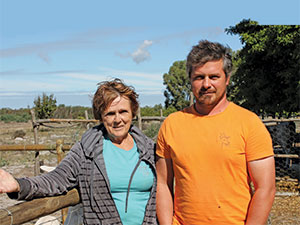
Anne Turner and Wessel Etzebeth founded De Böcke Goat Dairy in Klein Dassenberg near Malmesbury in 2011.
“At first, we milked the goats by hand, but soon realised there were easier, more hygienic methods. So we bought a two-point milking machine,” recalls Anne. “Within no time, we had more milk than we knew what to do with. We fed some of it to the pigs and a bull calf we had rescued, but were still left with a surplus.
Then Anne and Wessel hit on the idea of using the excess to make goat milk products. They did some research and found out that this market, despite being small and niched, was still growing and offered an ideal opportunity for a new small player.
Determined to launch their enterprise properly, they bought two more goats and Wessel went on a cheesemaking course in February 2012. Soon he was experimenting with making various kinds of cheeses and yoghurt. The pair named their business De Böcke Goat Dairy (German for ‘The Goats’) and concentrated on getting the basics of cheesemaking right: top rate milk, a quality active culture and strict hygiene throughout.
Management
“We only really started producing on a small, commercial scale in November 2012 when we began selling at a fresh produce market. We now supply delis in and around Cape Town,” explains Wessel. Keen to experiment, he tried his hand at making a range of dairy products. Soon, however, their customers’ favourites became clear, and the range was narrowed to feta, fromage frais and yoghurt.

Carlos Kekana is being trained at milking the goats to give Wessel more time to concentrate on marketing.
With their business taking off steadily and their first kidding season behind them, they are now milking 12 goats and producing cheese and yoghurt daily. “We’ve been buying in more kids and have five Saanen, three Alpine and four Toggenburg ewes that we currently milk. The Saanen produce more milk, but the Alpine and Toggenburg produce milk with a higher butterfat content,” explains Wessel.
During their first lactation, the ewes produce only about 1,7l of milk a day, but with mature ewes this can increase to 4l a day. The goats are milked twice a day, and total daily yield is about 23l. “But we don’t want to chase high milk yields at the expense of the health and well-being of the animals,” stresses Wessel. “Our farming philosophy isn’t based only on business principles. We want what is best for our animals.” Approximately 1l of milk is required for 1l of yoghurt, 12l of milk for 1kg of fromage frais, and 8l of milk for 1kg of feta.
Breeding
Wessel admits that ideally, he would like to farm with only one breed of goat. But because of the advantages offered by the various breeds – Saanen for higher milk yields and Alpine and Toggenburgs for high butterfat content – he and Anne will probably have to farm with at least two breeds. The first breeding season was held in 2012. Wessel and Anne exchanged all their young rams for young ewes from another milk goat farmer. “We get four ewes for every ram,” says Anne.
They currently have one Alpine ram, with the others coming from milk goat farmers in the vicinity. There is no cross-breeding. Young ewes start breeding when they are about nine months old and weigh a minimum of 32kg. The gestation period is 150 days and the ewes are dried up two months before kidding. After birth, the kids are kept with their mothers for one week and then hand-fed powdered goat milk until they weigh 17kg.
“When the kids are about three weeks old, we gradually start introducing food such as small pellets, but we want to get them on a lucerne and hay only diet as soon as possible,” says Wessel. All the goats have ad lib access to lucerne and oat hay as well as fresh water. Inevitably, the cost of feed is a concern. “At the moment, we are buying in feed from farmers at R60 per bale and this chases up our input costs tremendously. But we are preparing land to start growing our own oats for feed this year, and this will save money,” he explains.

Buying in feed is proving to be extremely expensive. Within a year, Anne and Wessel hope to produce a large percentage of their own feed on the smallholding.
Future plans
De Böcke Goat Dairy has been chosen as one of 10 new, small cheesemakers to receive sponsored exhibition space at the annual SA Cheese Festival, which takes place from 26 to 28 April at Sandringham near Stellenbosch. This will enable them to gain valuable exposure for their businesses and products. According to Johan Ehlers, CEO of Agri-Expo and convener of the festival, one of his organisation’s main aims is to support the development of the country’s dairy industry.
“With the help of Absa, we’re able to give emerging boutique cheesemakers the opportunity to introduce their products to more than 30 000 visitors over a single weekend,” he says. Wessel believes that De Böcke’s participation in the cheese festival will not only serve as a marketing platform for its brand, but allow him and Anne to compare their dairy products with those of their competitors.
As far as the future of the business itself goes, they are keeping their options open. “At this stage, neither of us is really sure how many goats we want to keep ultimately, or how large we want the operation to be,” he says. “We’ll simply expand incrementally in response to the consumer demand for our products and take it from there.”
Contact Wessel Etzebeth on 072 249 7733 or email [email protected]











